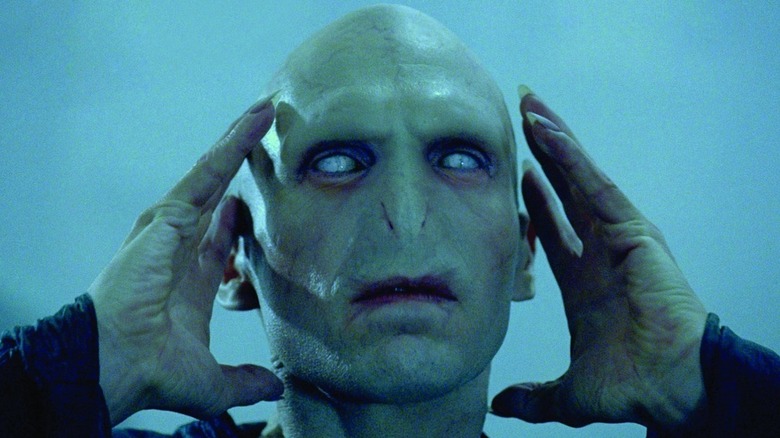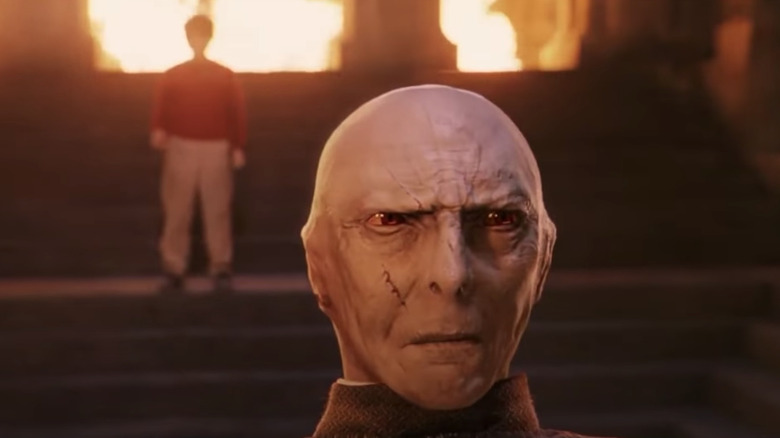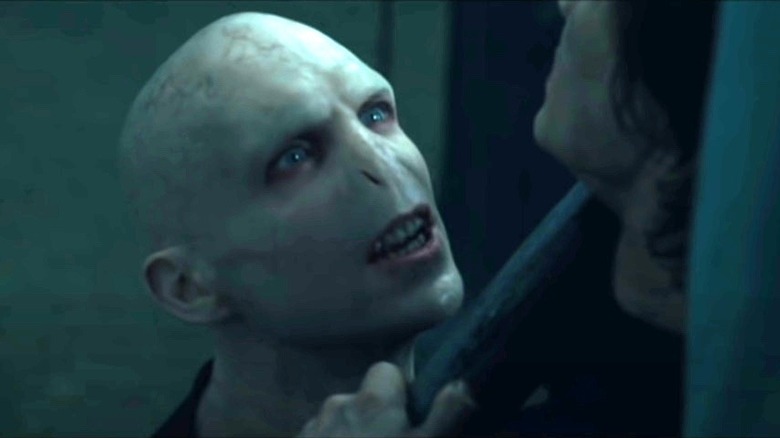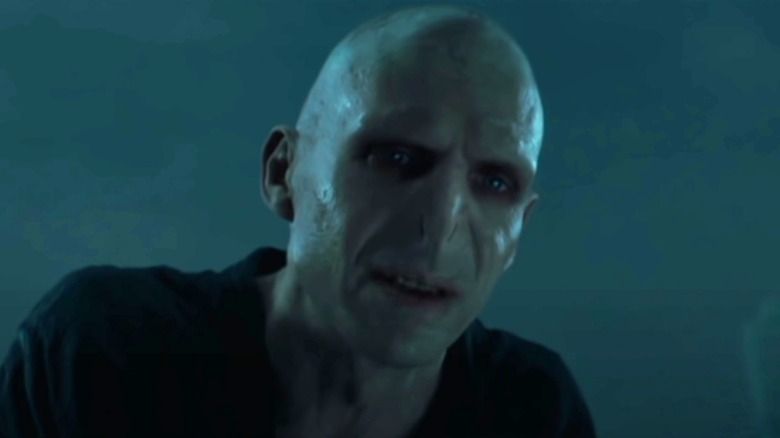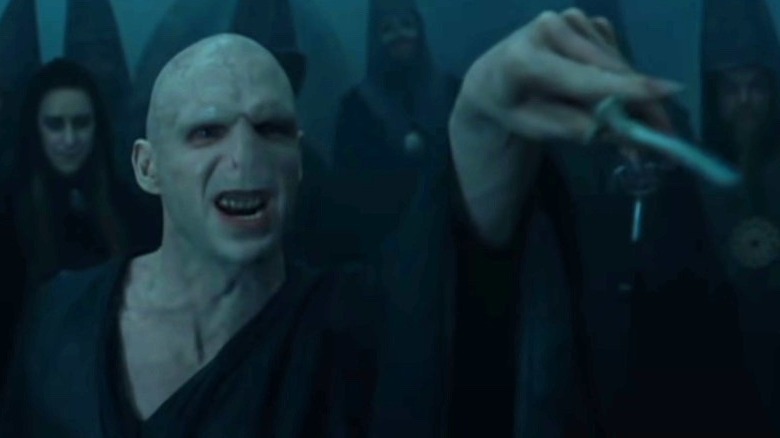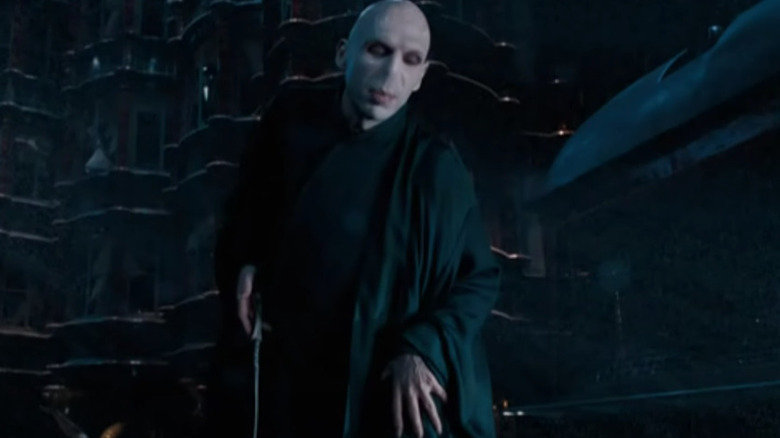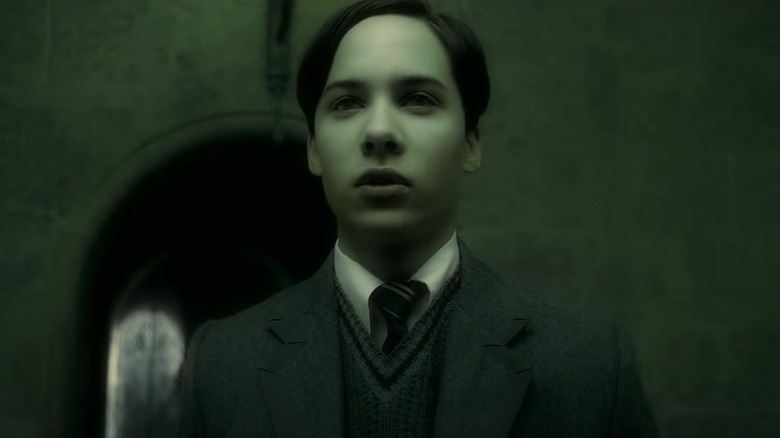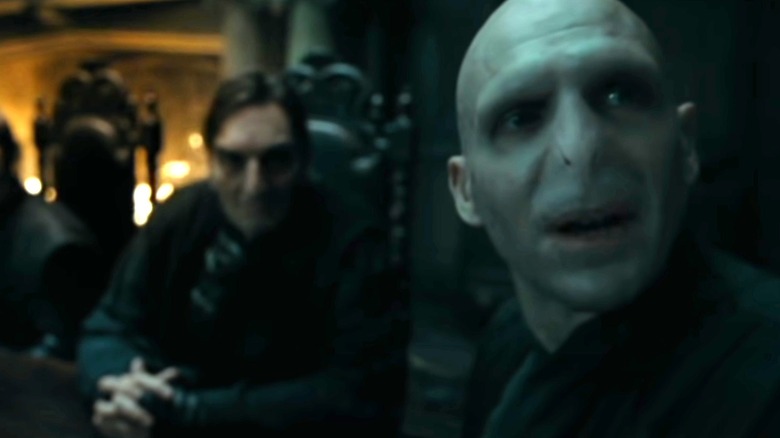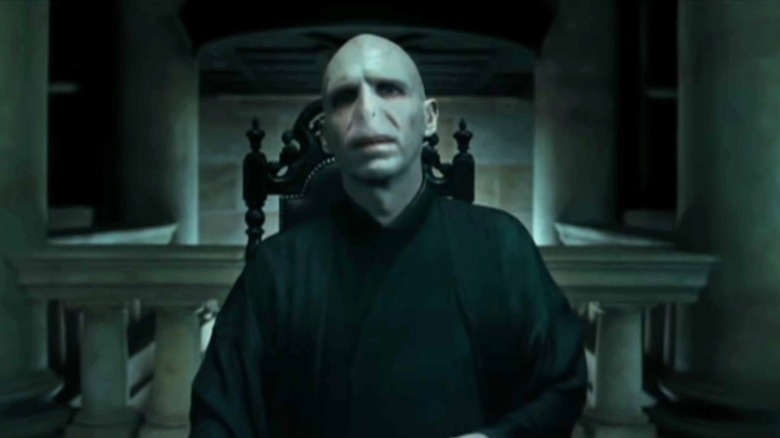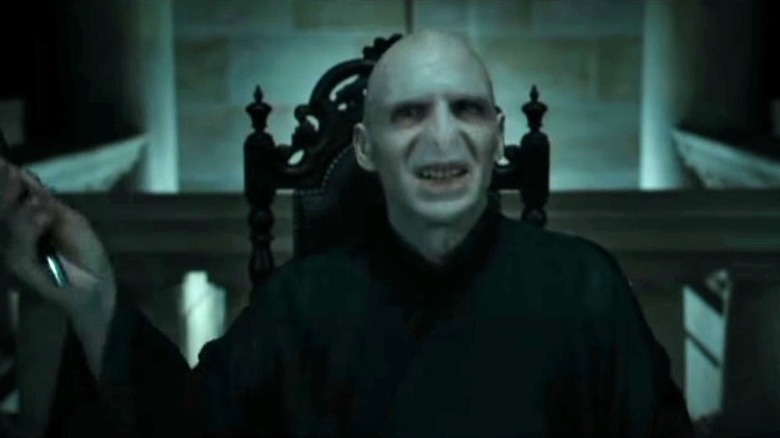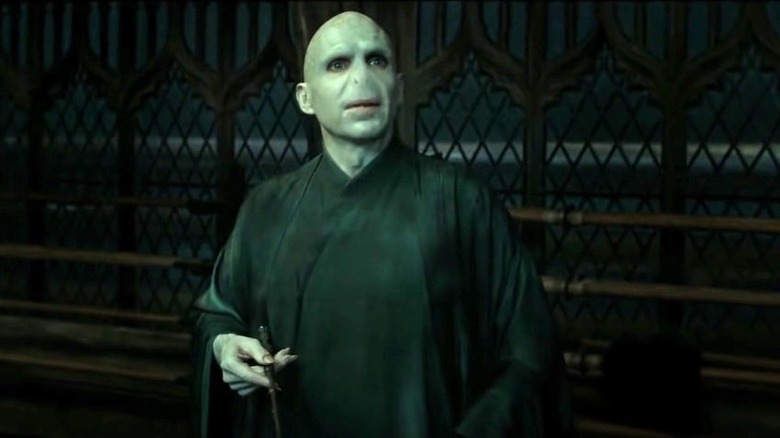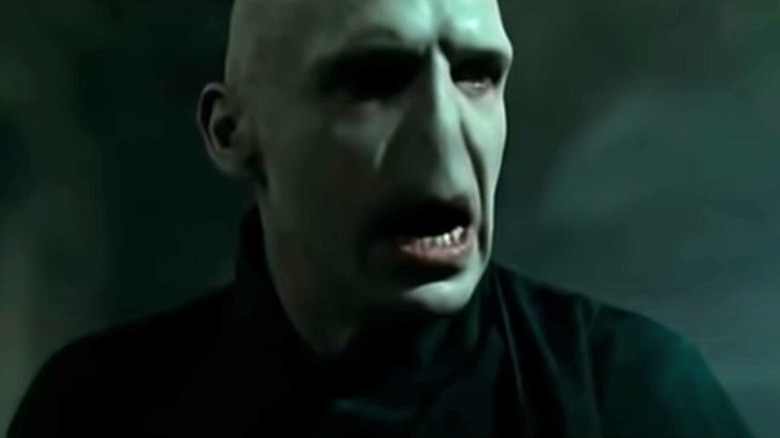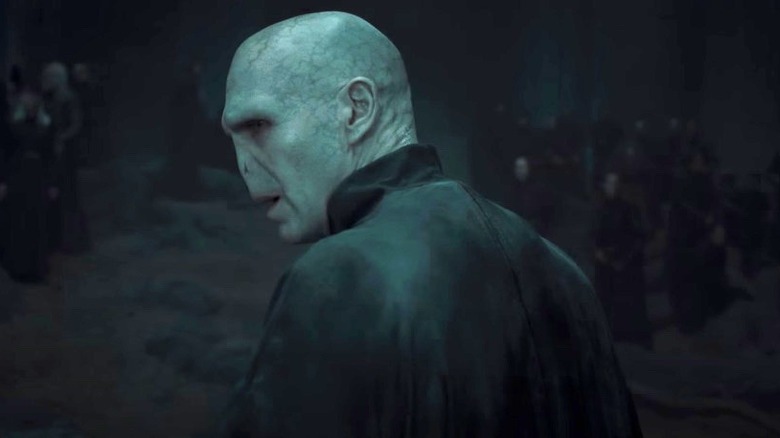Most Memorable Voldemort Quotes In The Harry Potter Movies
The eight-film "Harry Potter" series remains one of the most beloved and popular movie franchises of all time thanks to its wondrous world of magic, wizardry, and adventure. The saga, based on J.K. Rowling's bestselling series of novels, also boasts one of cinema's great movie villains in He Who Must Not Be Named, aka Lord Voldemort.
Portrayed by Academy Award-nominated actor Ralph Fiennes, this evil wizard haunted the dreams of children everywhere as a result of his terrifying visage — his nose is merely two snake-like slits on his face — a complete disregard for compassion or empathy, and tendency to murder innocent people without remorse.
In the films, Voldemort doesn't fully return to power until the final stages of "Harry Potter and the Goblet of Fire," but the character certainly makes the most of his relatively brief screen time and delivers a number of memorable (often scary) bits of dialogue that resonate with audiences long after the credits roll. Here are the dark wizard's most unforgettable quotes from the Harry Potter films, many of which offer a unique insight into Voldemort's broken persona and, in a way, help viewers understand his inner workings a little more clearly.
There is no good and evil. There is only power. And those too weak to seek it
Voldemort first appears to Harry Potter during the climax of 2001's "Harry Potter and the Sorcerer's Stone" as a face fixed to the back of Defense Against the Dark Arts teacher Professor Quirinus Quirrell's head. At this moment, audiences carry scant details about He Who Must Not Be Named — specifically that he was responsible for Harry's parents' deaths, has spent the time since his disappearance feasting on unicorn blood in the Forbidden Forest, and is plotting to extract the Sorcerer's Stone from Hogwarts with the help of someone inside the castle.
When Voldemort finally makes his presence known to the famous boy wizard, he beckons Harry with promises of immortality and unlimited power.
"That's it, Harry," Voldemort hisses, "There is no good and evil. There is only power. And those too weak to seek it. Together, we'll do extraordinary things. Just give me the stone!"
Voldemort believes power triumphs over everything, including all notions of good and evil, love and compassion. His ignorance of such emotions stems from a troubled childhood and exemplifies the threat he poses to the wizarding world and humanity at large. After all, how does one reason with a being who quite literally lacks a soul?
It was old magic, something I should have foreseen
During the graveyard scene toward the end of "Harry Potter and the Goblet of Fire," Voldemort explains the magic that defeated him so many years ago, revealing that Lily Potter's love for her son made it impossible for Voldemort to harm Harry. As a result, his death curse backfired and left the Dark Lord clinging to life.
"It was love," Voldemort tells Harry and a group of terrified Death Eaters. "You see, when dear, sweet Lily Potter gave her life for her only son ... she provided the ultimate protection. I could not touch him. It was old magic. Something I should have foreseen. But no matter, no matter. Things have changed. I can touch you ... now."
This entire moment is huge within the context of the story. Not only does Voldemort reveal how Harry survived, but the piece of dialogue also reaffirms the Dark Lord's tendency to overlook the simple (but powerful) magic tied to human affection in favor of physical objects such as the Deathly Hallows. Ironically, the Dark Lord's desire for power proves to be his greatest weakness.
I'm going to kill you, Harry Potter. I'm going to destroy you
After "Sorcerer's Stone," Harry battles a fragment of Voldemort's soul — a younger version of the wizard, called Tom Riddle — in "Harry Potter and the Chamber of Secrets," but it isn't until "Harry Potter and the Goblet of Fire" that we finally see Voldemort return to his ghastly physical form. His resurrection prompts one of the film series' best climaxes, during which Harry squares off with the Dark Lord in a creepy graveyard.
This bit also offers up some of the evil wizard's most memorable lines. After a nice dose of torture by way of the Cruciatus and Imperius curses, Voldemort leans over Harry and says matter-of-factly, "I'm going to kill you, Harry Potter. I'm going to destroy you. After tonight, no one will ever again question my power. After tonight if they speak of you, they'll only speak of how you begged for death. And how I, being a merciful Lord ... obliged."
Fiennes' delivery of the dialogue certainly sticks with the viewer, but it's really Harry's terrified reaction that drives this moment home. The boy wizard already fears he's about to die; hearing the words slither out of Voldemort's mouth only increases his sense of dread.
Don't you turn your back on me, Harry Potter! I want you to look at me when I kill you!
Another terrific line delivered by Voldemort during the "Goblet of Fire" graveyard finale occurs after the evil wizard challenges Harry to a duel. The young wizard manages to slip behind some headstones, infuriating his foe, who screams "Don't you turn your back on me, Harry Potter! I want you to look at me when I kill you! I want to see the light leave your eyes!"
Fiennes' performance as the evil wizard is simply spectacular. He infuses the character with so much raw, unbridled hatred that it's difficult not to be shook by any of his theatrical outbursts. Yet at this moment, there's a growing sense of desperation in his voice. The fallen wizard desires nothing more than to eliminate the "Boy Who Lived" once and for all, but Voldemort also fears Harry and will not be able to move on from his obsession until he literally sees the life fade from the young man's eyes.
It's truly a wonder that Harry was able to muster enough courage in this moment to step out from behind his hiding spot and face Voldemort and his Death Eaters.
You are a fool, Harry Potter, and you will lose everything
Voldemort doesn't appear in "Harry Potter and the Order of the Phoenix" until the action-packed climax, but he certainly leaves quite an impact with his limited screen time — in fact, his mesmerizing duel against Dumbledore in the main hall of the Ministry of Magic remains one of the coolest scenes in the series. The pair of powerful wand wielders hurl any number of magical spells at the other with spectacular results. Once Voldemort realizes his defeat is all but assured, he turns his attention to Harry in an attempt to destroy the young wizard's spirit.
Naturally, Harry fights back and manages to push Voldemort away using positive memories of his friends and loved ones, prompting the Dark Lord to vacate his body. "You are a fool, Harry Potter, and you will lose everything," he says before vanishing.
The dialogue stings because Harry has already lost his parents and moments ago witnessed the death of his godfather, Sirius Black. How great a toll will Harry pay to defeat Voldemort? At this point in the story, all the audience can do is hope the price of victory isn't too steep.
I read something rather odd about a bit of rare magic. It's called, as I understand it ... a Horcrux
Certainly, one of the most important pieces of Voldemort dialogue arrives in "Harry Potter and the Half-Blood Prince."
Late in the film, Harry, on Dumbledore's orders, looks inside a magical device known as a pensieve and witnesses an important conversation that occurred years earlier between Professor Horace Slughorn and Tim Riddle, aka young Voldemort.
"I was in the library the other night, in the restricted section," Riddle explains, "and I read something rather odd about a bit of rare magic. It's called, as I understand it ... a Horcrux."
Riddle's revelation forces Dumbledore into action as he now clearly understands how to defeat Voldemort once and for all.
A Horcrux is a magical object containing a fragment of a wizard's soul. The wizard cannot fully die while these pieces remain, rendering the soul's owner immortal. Slughorn's memories reveal that Voldemort split his soul into seven parts and stored them in random objects — a diary, a ring, a locket, a cup, a diadem, a snake, and (unwittingly) Harry himself — thus setting up Harry's final quest to rid the world of the Dark Lord once and for all.
Severus. I was beginning to worry that you had lost your way
The opening of "Harry Potter and the Deathly Hallows Part 1" features one of the best Voldemort scenes in the entire franchise. The Dark Lord presides over a council of Death Eaters and pauses long enough to deliver a not-so-cryptic greeting to a tardy Severus Snape — who is just months removed from supposedly murdering Dumbledore at the end of "Harry Potter and the Half-Blood Prince" in Voldemort's name.
"Severus," Voldemort says quietly, "I was beginning to worry that you had lost your way."
There's clearly a double meaning behind Voldemort's words as he not only chastises Snape for his late arrival, but also wonders (along with the audience) whether his servant remains fully invested in his cause. Naturally, Snape gives nothing away with his emotionless expression, leaving Voldemort with no choice but to trust his ally — for the time being.
I must be the one to kill Harry Potter
One of the more intriguing relationships in the Harry Potter saga lies between Voldemort and his evil minion Bellatrix Lestrange. The latter clearly yearns for the Dark Lord's approval and willingly puts her life in harm's way to demonstrate her unfailing support. Yet while Voldemort clearly admires her enthusiasm, the wizard has built a wall between himself and even his most loyal subjects — he never fully appreciates their allegiance, choosing instead to rule by fear.
Shortly after Severus Snape's arrival to the Death Eater council at the beginning of "Harry Potter and the Deathly Hallows Part 1," Voldemort discusses his plans to kill Harry Potter once the young wizard's magical protection breaks on his seventeenth birthday. Ever eager to please her master, Bellatrix offers to kill the boy, prompting Voldemort to deliver the closest thing to a compliment he can muster.
"As inspiring as I find your bloodlust, Bellatrix, I must be the one to kill Harry Potter," he says softly, though his words still cause Bellatrix to recoil in her seat.
Surely, this moment reveals just how dangerous a villain Voldemort truly is, as even a character as psychotic as Belltrix shrivels under his presence, leaving one to wonder why anyone would ever consider following the Dark Lord in the first place.
It is Ms. Burbage's belief that Muggles are not so different from us
The Death Eaters sequence at the beginning of "Harry Potter and the Half-Blood Prince" is creepy in its own right, but there's another aspect to the scene that renders it downright disturbing.
Floating above the Death Eaters when Severus Snape enters the room is Charity Burbage, a Hogwarts professor who harbors an appreciation for Muggles. Voldemort, almost passively, introduces her with a sneer. "To those of you who do not know: We are joined tonight by Ms. Charity Burbage, who until recently taught at Hogwarts School of Witchcraft And Wizardry," he tells the room. "Her specialty was Muggle Studies. It is Ms. Burbage's belief that Muggles are not so different from us. She would, given her way, have us ... mate with them."
Voldemort's statement causes the surrounding Death Eaters, save for Draco Malfoy and Snape, to taunt Burbage. Helpless, the Hogwarts instructor pleads for her life to no avail as Voldemort hits her with the killing curse "Avada Kedavra" and drops her lifeless corpse onto the table for his pet snake Nagini to feast on.
Audiences learn a lot about Voldemort from this bit of dialogue. The Dark Lord desperately hates Muggles, or non-magical folk, and will do anything to rid the world of their presence, further establishing just how important it is for Harry Potter to fulfill his quest.
You've been a good and faithful servant, Severus — but only I can live ... forever
Perhaps the most impactful line spoken by Voldemort in the Harry Potter film series arrives during a pivotal moment in "Harry Potter and the Deathly Hallows Part 2." Late in the film, after the Battle of Hogwarts has taken its toll, Voldemort adjourns for a brief meeting with Severus Snape in the school boathouse. Up until this point, Voldemort has assumed he possesses the Elder Wand — the most powerful of the titular Deathly Hallows — unaware that Harry unwittingly took control of the fabled weapon during a previous confrontation with Draco Malfoy, who, in turn, unknowingly took it following his disarming of Dumbledore at the end of "Harry Potter and the Half-Blood Prince."
Voldemort incorrectly believes the wand's allegiance switched to Severus Snape after he killed Dumbledore — leading the Dark Lord to viciously murder the Hogwarts professor, but not before delivering this wicked line: "You killed Dumbledore, Severus. While you live, the Elder Wand cannot truly be mine. You've been a good and faithful servant, Severus — but only I can live ... forever."
The line sticks with audiences mostly because of the brutal violence that immediately follows, but also because Snape had (in Voldemort's eyes) remained a powerful ally. Yet the Dark Lord cares more about power than loyalty or friendship, and destroys a key cog in his regime without much thought or care, again demonstrating Voldemort's despicable, remorseless nature.
Every drop of magical blood spilled is a terrible waste
Following his murder of Severus Snape, Voldemort tells his armies to back down during the Battle of Hogwarts and proceeds to deliver this menacingly memorable bit of dialogue: "I do not wish this. Every drop of magical blood spilled is a terrible waste. I therefore command my forces to retreat."
Interestingly, Voldemort is mostly telling the truth during this brief moment. He certainly does respect the students at Hogwarts for their bravery, however foolhardy their quest may seem in his eyes, and likely does not enjoy watching pure-bloods die for what he assumes is a worthless — and hopeless — cause.
Of course, we know how far loyalty runs with Voldemort, who continually kills, abuses or humiliates even his most devoted subjects — including Draco Malfoy's father Lucius, Bellatrix Lestrange, and Severus Snape — which is probably why the Dark Lord's empty commendations ultimately ring hollow for the battle-weary students and one of the main reasons they refuse to give up even when all hope is seemingly lost.
Harry Potter, the boy who lived ... come to die
No line induces goosebumps — or chills — quite like Voldemort's final slight to Harry right before the Dark Lord "kills" the young boy.
"Harry Potter, the boy who lived ... come to die," Voldemort exclaims while sitting among his clan of Death Eaters in the Forbidden Woods.
At this point in "Harry Potter and the Deathly Hallows: Part 2," Harry has learned the truth about everything from Severus Snape's tragic past to the meaning behind his scar. Harry, as it turns out, is a Horcrux. Put more simply, the young wizard carries a fragment of Voldemort's soul inside him that must be destroyed in order to defeat the evil wizard.
Following this revelation, Harry ventures to meet his nemesis in the Forbidden Forrest, happy to lay down his life for his friends; and Voldemort happily obliges by blasting him with the killing curse "Avada Kedavra" — unaware that doing so more or less seals his own fate. The curse manages to destroy the Horcrux inside Harry, leaving Voldemort more vulnerable than before.
